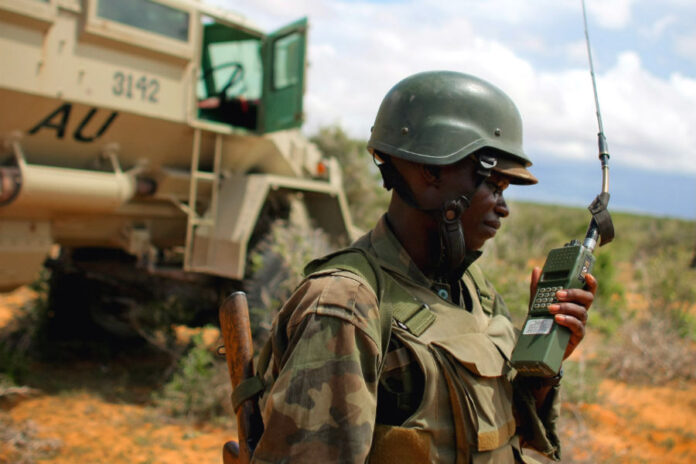MOGADISHU [SMN] – Somalia and the African Union on Thursday agreed to have their respective technical teams re-examine the future of the combat mission, Amisom, whose mandate was extended recently to the end of March 2022.
And in a show of compromise, the two sides, who have recently haggled over what form the African Union Mission in Somalia (Amisom) should take, appeared to agree on the basics, including predictable funding and a focus on Al-Shabaab and other terror merchants in Somalia.
At a meeting between Somalia’s federal government, the African Union Commission (AUC) and Amisom representatives, it was generally agreed that technical teams begin discussions from January 10 for 30 days.
The teams will then resubmit their report to the African Union Peace and Security Council from February 11, to inform the actual format the mission will take.
Mogadishu meeting
The decision, indicated in a joint communique on Thursday, came after the AUC delegation, led by Alhaji Sarjoh Bah, director of conflict management, met in Mogadishu with Somali government officials, including federal minister for defence Abdulkadir Mohamed Nur and his internal security counterpart Abdullahi Mohamed Nor.
The meeting was also attended by the Amisom boss, Mozambican diplomat Francisco Madeira, and other Amisom senior military officials.
It was crucial because Amisom’s mandate, which was last week extended by the UN Security Council by three months, appeared to expire without a formal agreement on what will replace it.
They agreed that Somalia will resubmit its Transition Plan, a document initially tabled at the AU Peace and Security Council in February, arguing that Amisom stay on until 2023, as Mogadishu gradually picks up the duties of protecting liberated areas.
They also agreed that a joint technical team composed of officials from the Federal Government of Somalia and the African Union resume discussions on January 10 and finish by February 2022.
Both sides, the communique said, recognise “the need for a reconfigured AU transition Mission in Somalia to have a practicable and sustainable funding mechanism”.
Fight Al-Shabaab
Amisom was created in 2007 to fight Al-Shabaab, but more than 13 years the threat from the militants persists. While both sides acknowledge the mission’s role in driving the Shabaab from crucial cities such as Mogadishu and Kismayu, Somalia argues it needs to start taking over responsibility by improving the capacity of its own troops.
The AU, though, appeared wary of a quick handover, citing the existing threat from the Shabaab, which still controls a significant chunk of the countryside. In October, the AU Peace and Security Council accepted one of the four recommendations tabled by an independent technical team hired by the AU earlier in June.
The council endorsed a hybrid mission to take over from Amisom, and which would be funded by the UN and include troop contributors from UN member states, as well as segments for technocrats and other institution-rebuilding experts.
Scepticism
This suggestion, though endorsed by the five troop contributors – Kenya, Ethiopia, Djibouti, Ethiopia, Burundi and Uganda – has been met with scepticism from some UN Security Council members because of concerns about funding.
On Thursday, the Somalia government agreed with the AU to discuss the transition plan only based on principles that will place the continental body in the central role, respect Somalia’s leadership of the transition and provide for adequate funding to defeat Al-Shabaab.
They also agreed that Amisom or whatever replaces it must work within international law and be accountable to financiers, troop contributors and the public it serves.






